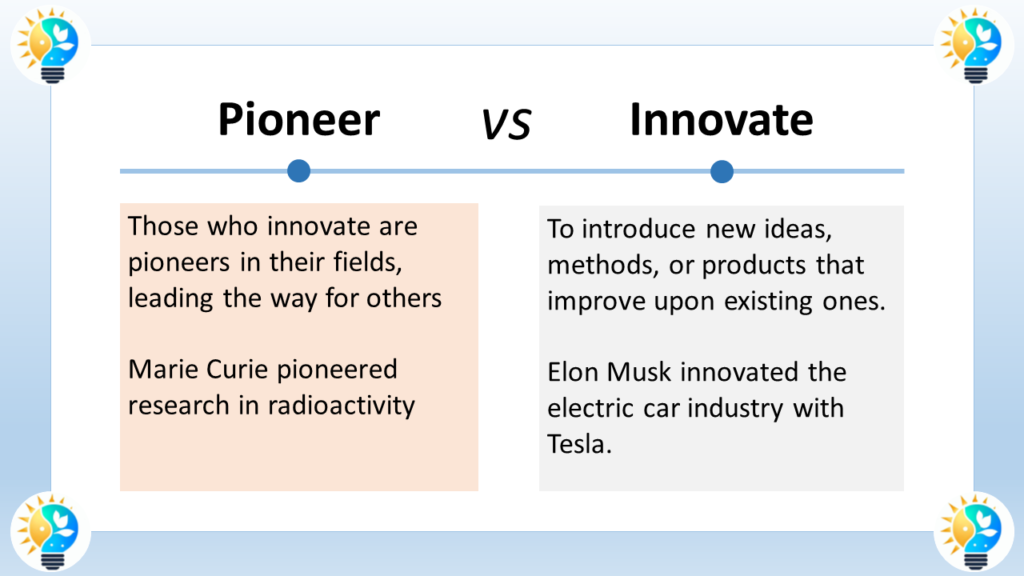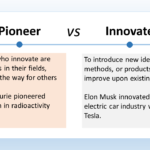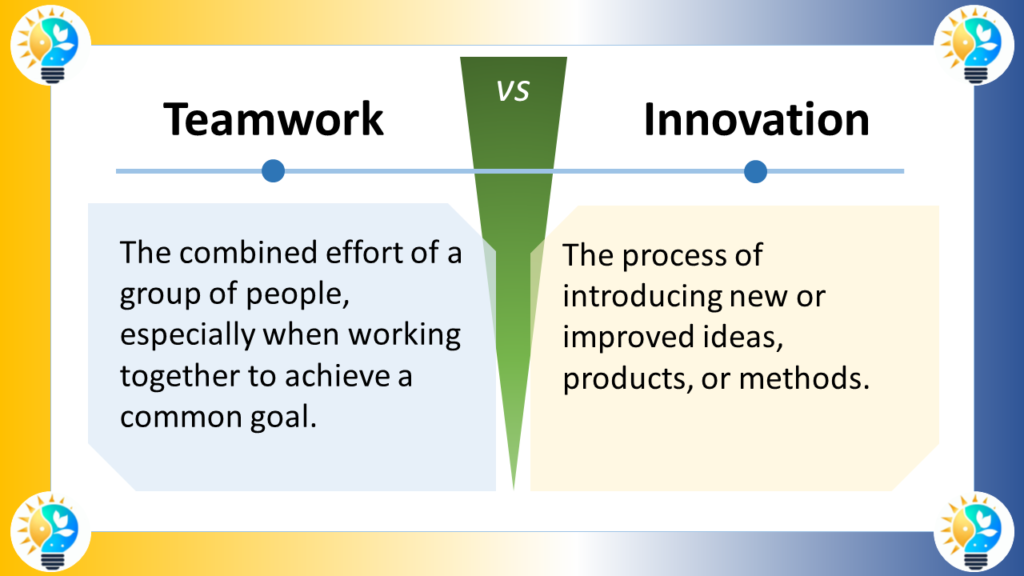Pioneering involves being the first to do something or develop new ideas, while innovating involves improving upon existing ideas.
Pioneering is often a one-time event, while innovating is an ongoing process.

Definition
To Innovate
Innovation is the process of introducing new or improved ideas, products, services, or processes into the market or society. To innovate is to make changes to something established by introducing something new. Innovation often involves coming up with inventive solutions to problems through a process of experimentation and development
To pioneer
To pioneer means to be among the first to explore or settle a new area, introduce new methods or ideas, or open up new fields. Pioneers are individuals who take the lead in developing something new that others can follow.
More Synonyms on innovation, innovate and innovative:

Innovation is considered as a driving force in progress.
It includes the introduction of novel ideas, methods, or products that bring positive change and advancement.
For more information about innovations, check our glossary
What does it mean to innovate?
Innovation is the process of introducing new or improved ideas, products, services, or processes into the market or society. To innovate is to make changes to something established by introducing something new. Innovation often involves coming up with inventive solutions to problems through a process of experimentation and development. Some key aspects of innovation include:
- Developing new and creative ideas
- Adapting existing ideas for new usages
- Improving efficiency and effectiveness of existing solutions
- Finding new applications for technologies, materials, or processes
- Meeting new requirements, needs, or challenges through original solutions
Innovation is important for businesses and organizations to stay relevant, solve problems, and drive progress. Constant innovation allows businesses to compete and be leaders in their industries <sup>[1]</sup>.
What does it mean to pioneer?
To pioneer means to be among the first to explore or settle a new area, introduce new methods or ideas, or open up new fields. Pioneers are individuals who take the lead in developing something new that others can follow. Some key characteristics of pioneers include:
- Being the first to venture into uncharted territory or new domains
- Introducing groundbreaking concepts, approaches, or technologies
- Blazing trails that enable further advances and developments
- Breaking new ground and overcoming obstacles to achieve success
- Serving as models for others to build upon their work
While innovators focus on introducing improvements, pioneers are focused on establishing entirely new possibilities and paradigms. Pioneers are risk-takers who forge ahead into the unknown to make new discoveries and lay the foundation for others. Their work opens up new horizons and opportunities <sup>[2]</sup>.
The relationship between innovating and pioneering
Those who innovate are often pioneers in their fields, as innovation frequently requires venturing into uncharted areas and introducing novel ideas, approaches, or technologies. While all pioneers innovate to a degree, not all innovators can be considered pioneers. Some key points about the relationship between innovating and pioneering:
Pioneers innovate through groundbreaking work
Individuals and organizations that pioneer new domains must innovate by developing creative and original solutions. Their work represents major advances that significantly differ from existing paradigms. Their innovations establish new possibilities and move fields forward.
Not all innovation requires pioneering
Some innovations stem from incremental improvements or new applications of existing ideas and technologies. This type of incremental innovation does not require pioneering new territory in the same way that transformative innovations do. Incremental innovators build on prior work while pioneers break new ground.
Pioneering enables subsequent innovation
The work of pioneers opens up new areas ripe for further innovation. By establishing new fields, addressing major challenges in novel ways, and bringing transformative technologies to life, pioneers enable a wave of additional innovations to build upon their work. Subsequent innovators have pioneering work to stand on.
Innovation is needed to sustain pioneering work
Once initial pioneering work has occurred, continuous innovation is still required to sustain leadership in new domains and keep progressing the field. Pioneers must innovate further to develop their initial ideas, overcome challenges, and maintain their competitive edge. Their work does not stop at an initial breakthrough.
In summary, while not all innovation requires pioneering and not all pioneers focus exclusively on innovation, the two concepts are strongly related. Boldly pushing new boundaries through transformative work is what enables true pioneering, and pioneering lays the foundation for subsequent waves of innovation. Together, pioneering and innovating drive progress.
Innovative vs Pioneering
Difference Between Innovating and Pioneering
Innovation and pioneering are closely related concepts but have distinct differences:
- Innovation: Refers to the process of introducing new ideas, methods, or products to the market, involving creating something new or improving upon existing products or services[1].
- Pioneering: Involves being the first to do something or explore new territories, requiring taking risks and venturing into uncharted territory. It is about trailblazing, groundbreaking, or revolutionary actions[1][3].
When using these terms:
- Innovative is about being new and creative, while pioneering is about being the first of its kind or opening up new possibilities[1].
- Innovative should be used for something new and creative, while pioneering should be reserved for groundbreaking or revolutionary actions[1].
- Pioneering should not describe incremental improvements but rather truly groundbreaking endeavors[1].
Understanding these distinctions can enhance communication effectiveness and accuracy in various fields where innovation and pioneering play crucial roles.
Innovative Terms

Innovation is considered as a driving force in progress.
It includes the introduction of novel ideas, methods, or products that bring positive change and advancement.
For more information about innovations, check our glossary


